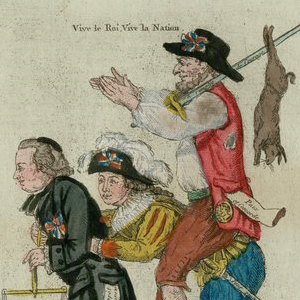Revolutions

The Crushed Aristocracy
This image uses the classical figures of an angel and a cherub to celebrate the achievements of Louis XVI on the base of a statue. The words state that he has destroyed the "aristocracy" and established the liberty of the French people.

The Welcoming of a Marquis in Hell
Reflecting French Revolutionary sentiments, the image points out the destruction of the nobility, depicting the arrival in Hell of a "marquis" and several other "aristocrats," described in the legend as "conspirators" and "traitors."
Abolition of Nobility
The major principle underlying the 4 August decree found legislative expression in the decree of 19 June 1790.

We Must Hope That It Will Soon Be Over
A common complaint of pre-revolutionary rural petitions was the abuse of seigneurial dues owed by French peasants to lords supposedly in exchange for protection and supervision.

Oath of the New Horaces
Social discrimination against old regime elites continued in this parody of a famous painting prior to the French Revolution, The Oath of the Horatii, by Jacques–Louis David which focused on the courage of three brothers who thrust their arms bravely forward to signal their willingness t

I Was Sure We Would Have Our Turn
Class solidarity was never universal, as this print celebrates the victory of the peasantry over the nobility and clergy.

Awakening of the Third Estate
With the Bastille being destroyed in the background, a member of the Third Estate breaks his shackles. Here, the clergy and nobility recoil in fear, thereby emphasizing the conflict between the estates during the French Revolution.

Through Me You Are All Brothers
Reflecting the sentiments of the French Revolution, this image shows the three orders unified by religion. The Virgin standing at right in a cloud holds a cross from which rays emanate to three figures representing the clergy, nobility, and Third Estate.

General Federation of the French
This image provides a visual overview of the Festival of Federation of 14 July 1790.
Source Collection: Social Causes of the French Revolution
Instead of bringing unity and a quick, political resolution to the questions of 1789, as intended by its originators, the Revolution was producing further conflicts. What had happened? Had the revolutionaries expected too much?